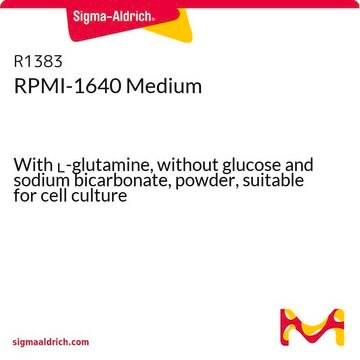R7509
Medio RPMI-1640
With sodium bicarbonate, without ʟ-glutamine and phenol red, liquid, sterile-filtered,suitable for cell culture
Sinónimos:
Roswell Park Memorial Institute 1640 medium
About This Item
Productos recomendados
product name
Medio RPMI-1640, Modified, with sodium bicarbonate, without L-glutamine and phenol red, liquid, sterile-filtered, suitable for cell culture
Quality Level
sterility
sterile-filtered
form
liquid
technique(s)
cell culture | mammalian: suitable
impurities
endotoxin, tested
components
phenol red: no
L-glutamine: no
HEPES: no
sodium pyruvate: no
NaHCO3: yes
shipped in
ambient
storage temp.
2-8°C
¿Está buscando productos similares? Visita Guía de comparación de productos
General description
Application
- to culture Mantle cell lymphoma cells
- to culture mouse podocytes
- in the extraction of whole bone marrow from rat Femur and tibia bones
Other Notes
Use this medium when working with stem cells or when growing cells at low densities.
Also recommended for in vitro diagnostics use.
also commonly purchased with this product
supplement
Storage Class
12 - Non Combustible Liquids
wgk_germany
WGK 1
flash_point_f
Not applicable
flash_point_c
Not applicable
Certificados de análisis (COA)
Busque Certificados de análisis (COA) introduciendo el número de lote del producto. Los números de lote se encuentran en la etiqueta del producto después de las palabras «Lot» o «Batch»
¿Ya tiene este producto?
Encuentre la documentación para los productos que ha comprado recientemente en la Biblioteca de documentos.
Los clientes también vieron
Nuestro equipo de científicos tiene experiencia en todas las áreas de investigación: Ciencias de la vida, Ciencia de los materiales, Síntesis química, Cromatografía, Analítica y muchas otras.
Póngase en contacto con el Servicio técnico





